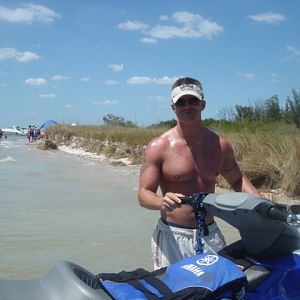6.1 AFTERSHOK HIT HAITI THIS MORNING
PORT-AU-PRINCE, Haiti - The most powerful aftershock yet struck Haiti on Wednesday, shaking more rubble from damaged buildings and sending screaming people running into the streets eight days after the country's capital was devastated by an apocalyptic quake.
The magnitude-6.1 temblor did not appear to cause major new damage in a city already nearly flattened by the Jan. 12 quake, but aid workers said it complicated rescue efforts and Prime Minister Jean-Max Bellerive said the government was sending teams to check on the situation in Petit-Goave, near the epicenter.
"We know they are going to need some help," he said.
At least one woman died of a heart attack, according to Eddy Thomas, a private undertaker.
"She had a heart condition, and the new quake finished her," he said while pushing her body along the street on a mobile stretcher.
Wails of terror rose from frightened survivors as the earth shuddered at 6:03 a.m. U.S. soldiers and tent city refugees alike raced for open ground, and clouds of dust rose in the capital.
The quake began as a slow vibration and then intensified into side-to-side shaking that lasted about eight seconds in Haiti's capital. Some in Port-au-Prince said the far stronger Jan. 12 quake seemed to last for 30 seconds.
The U.S. Geological Survey said Wednesday's quake was centred about 35 miles (60 kilometres) west-southwest of Port-au-Prince and 6.2 miles (9.9 kilometres) below the surface - a little further from the capital than last week's epicenter was.
"It kind of felt like standing on a board on top of a ball," said U.S. Army Staff Sgt. Steven Payne. The 27-year-old from Jolo, West Virginia was preparing to hand out food to refugees in a tent camp of 25,000 quake victims when the aftershock hit.
Last week's magnitude-7 quake killed an estimated 200,000 people in Haiti, left 250,000 injured and made 1.5 million homeless, according to the European Union.
The strong aftershock prompted Anold Fleurigene, 28, to grab his wife and three children and head to the city bus station. His house was destroyed in the first quake and his sister and brother killed.
"I've seen the situation here, and I want to get out," he said.
The new shake, combined with a light rain on Tuesday, has complicated rescue efforts, said Dr. Yi Ting Tsai, part of a Taiwanese crew digging for survivors near the ruined cathedra.
"The problem is the rain and the new quake this morning has made the debris more compact," he said.
Wednesday's magnitude-6.1 temblor was the largest of 49 aftershocks of magnitude-4.5 or greater that have followed the Jan. 12 quake.
USGS geophysicist Bruce Pressgrave said nobody knows if a still-stronger aftershock is possible.
"Aftershocks sometimes die out very quickly," he said. "In other cases they can go on for weeks, or if we're really unlucky it could go on for months" as the earth adjusts to the new stresses caused by the initial quake.
A massive international aid effort has been struggling with logistical problems, and many Haitians are still desperate for food and water.
But more aid was arriving on Wednesday, notably the U.S. Navy's floating hospital, USNS Comfort, which was already treating two severely injured quake victims when it dropped anchor in view of Port-au-Prince. She ship carries about 550 medical staff and about 60 civilian mariners.
Search-and-rescue teams have emerged from the city's ruins with some improbable success stories - including the rescue of 69-year-old ardent Roman Catholic who said she prayed constantly during her week under the rubble.
Ena Zizi had been at a church meeting at the residence of Haiti's Roman Catholic archbishop when the Jan. 12 quake struck, trapping her in debris. On Tuesday, she was rescued by a Mexican disaster team.
Zizi said after the quake, she spoke back and forth with a vicar who also was trapped. But he fell silent after a few days, and she spent the rest of the time praying and waiting.
"I talked only to my boss, God," she said. "I didn't need any more humans."
Doctors who examined Zizi on Tuesday said she was dehydrated and had a dislocated hip and a broken leg.
Elsewhere in the capital, two women were pulled from a destroyed university building. And near midnight Tuesday, a smiling and singing 26-year-old Lozama Hotteline was carried to safety from a collapsed store in the Petionville neighbourhood by the French aid group Rescuers Without Borders.
Crews at the cathedral recovered the body of the archbishop, Monsignor Joseph Serge Miot, who was killed in the Jan. 12 quake.
Authorities say more than 100 people have been pulled from wrecked buildings by international search-and-rescue teams and dozens of teams were still hunting through Port-au-Prince's crumbled homes and buildings for signs of life on Wednesday.
But the good news was overshadowed by the frustrating fact that the world still can't get enough food and water to the hungry and thirsty.
"We need so much. Food, clothes, we need everything. I don't know whose responsibility it is, but they need to give us something soon," said Sophia Eltime, a 29-year-old mother of two who has been living under a bedsheet with seven members of her extended family.
The World Food Program said more than 250,000 ready-to-eat food rations had been distributed in Haiti by Tuesday, reaching only a fraction of the 3 million people thought to be in desperate need.
The WFP said it needs to deliver 100 million ready-to-eat rations in the next 30 days, but it only had 16 million meals in the pipeline.
Even as U.S. troops landed in Seahawk helicopters Tuesday on the manicured lawn of the ruined National Palace, the colossal efforts to help Haiti were proving inadequate because of the scale of the disaster. Expectations exceeded what money, will and military might have been able to achieve.
Governments have pledged nearly $1 billion in aid, and thousands of tons of food and medical supplies have been shipped. But much remains trapped in warehouses, or diverted to the neighbouring Dominican Republic. Port-au-Prince's nonfunctioning seaport and many impassable roads complicate efforts to get aid to the people.
Aid is still being turned back from the single-runway airport, where the U.S. military has been criticized by some of poorly prioritizing flights. The U.S. Air Force said it had raised the facility's daily capacity from 30 flights before the quake to 180.
About 2,200 U.S. Marines have established a beachhead west of Port-au-Prince, joining 9,000 Army soldiers already on the ground. Lt. Cmdr. Walter Matthews, a U.S. military spokesman, said helicopters were ferrying aid from the airport into Port-au-Prince and the nearby town of Jacmel as fast as they could.
U.S. Defence Secretary Robert Gates said the military will send a port-clearing ship with cranes aboard to Port-au-Prince to remove debris that is preventing many larger aid ships from docking.
The U.N. was sending in reinforcements as well: The Security Council voted Tuesday to add 2,000 peacekeepers to the 7,000 already in Haiti, and 1,500 more police to the 2,100-strong international force.
"The floodgates for aid are starting to open," Matthews said at the airport. "In the first few days, you're limited by manpower, but we're starting to bring people in."
Hanging over the entire effort was an overwhelming fear among relief officials that Haitians' desperation would boil over into violence.
"We've very concerned about the level of security we need around our people when we're doing distributions," said Graham Tardif, who heads disaster-relief efforts for the charity World Vision. The U.N., the U.S. government and other organizations have echoed such fears.
-





